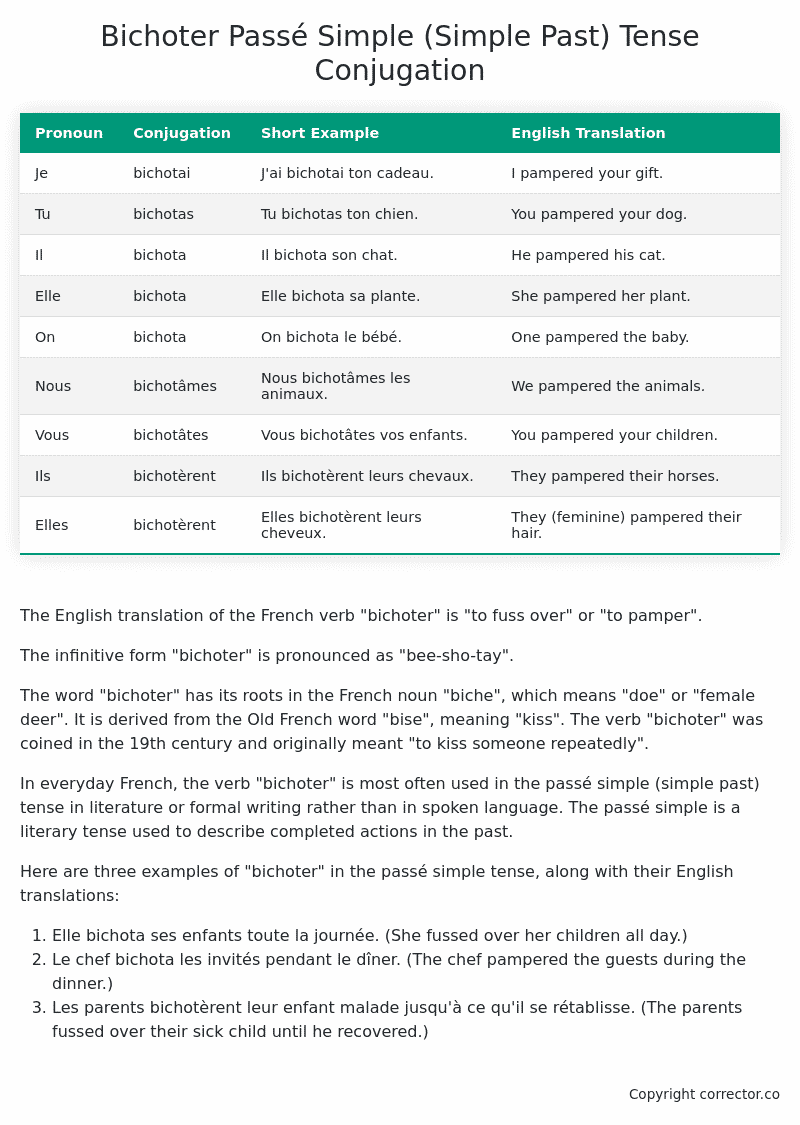Passé Simple (Simple Past) Tense Conjugation of the French Verb bichoter
Introduction to the verb bichoter
The English translation of the French verb “bichoter” is “to fuss over” or “to pamper”.
The infinitive form “bichoter” is pronounced as “bee-sho-tay”.
The word “bichoter” has its roots in the French noun “biche”, which means “doe” or “female deer”. It is derived from the Old French word “bise”, meaning “kiss”. The verb “bichoter” was coined in the 19th century and originally meant “to kiss someone repeatedly”.
In everyday French, the verb “bichoter” is most often used in the passé simple (simple past) tense in literature or formal writing rather than in spoken language. The passé simple is a literary tense used to describe completed actions in the past.
Here are three examples of “bichoter” in the passé simple tense, along with their English translations:
- Elle bichota ses enfants toute la journée. (She fussed over her children all day.)
- Le chef bichota les invités pendant le dîner. (The chef pampered the guests during the dinner.)
- Les parents bichotèrent leur enfant malade jusqu’à ce qu’il se rétablisse. (The parents fussed over their sick child until he recovered.)
Table of the Passé Simple (Simple Past) Tense Conjugation of bichoter
| Pronoun | Conjugation | Short Example | English Translation |
|---|---|---|---|
| Je | bichotai | J’ai bichotai ton cadeau. | I pampered your gift. |
| Tu | bichotas | Tu bichotas ton chien. | You pampered your dog. |
| Il | bichota | Il bichota son chat. | He pampered his cat. |
| Elle | bichota | Elle bichota sa plante. | She pampered her plant. |
| On | bichota | On bichota le bébé. | One pampered the baby. |
| Nous | bichotâmes | Nous bichotâmes les animaux. | We pampered the animals. |
| Vous | bichotâtes | Vous bichotâtes vos enfants. | You pampered your children. |
| Ils | bichotèrent | Ils bichotèrent leurs chevaux. | They pampered their horses. |
| Elles | bichotèrent | Elles bichotèrent leurs cheveux. | They (feminine) pampered their hair. |
Other Conjugations for Bichoter.
Le Present (Present Tense) Conjugation of the French Verb bichoter
Imparfait (Imperfect) Tense Conjugation of the French Verb bichoter
Passé Simple (Simple Past) Tense Conjugation of the French Verb bichoter (You’re reading it right now!)
Passé Composé (Present Perfect) Tense Conjugation of the French Verb bichoter
Futur Simple (Simple Future) Tense Conjugation of the French Verb bichoter
Futur Proche (Near Future) Tense Conjugation of the French Verb bichoter
Plus-que-parfait (Pluperfect) Tense Conjugation of the French Verb bichoter
Passé Antérieur (Past Anterior) Tense Conjugation of the French Verb bichoter
Futur Antérieur (Future Anterior) Tense Conjugation of the French Verb bichoter
Subjonctif Présent (Subjunctive Present) Tense Conjugation of the French Verb bichoter
Subjonctif Passé (Subjunctive Past) Tense Conjugation of the French Verb bichoter
Subjonctif Imparfait (Subjunctive Imperfect) Tense Conjugation of the French Verb bichoter
Subjonctif Plus-que-parfait (Subjunctive Pluperfect) Tense Conjugation of the French Verb bichoter
Conditionnel Présent (Conditional Present) Tense Conjugation of the French Verb bichoter
Conditionnel Passé (Conditional Past) Tense Conjugation of the French Verb bichoter
Conditionnel Passé II (Conditional Past II) Tense Conjugation of the French Verb bichoter
L’impératif Présent (Imperative Present) Tense Conjugation of the French Verb bichoter
L’impératif Passé (Imperative Past) Tense Conjugation of the French Verb bichoter
L’infinitif Présent (Infinitive Present) Tense Conjugation of the French Verb bichoter
L’infinitif Passé (Infinitive Past) Tense Conjugation of the French Verb bichoter
Le Participe Présent (Present Participle) Tense Conjugation of the French Verb bichoter
Le Participe Passé (Past Participle) Tense Conjugation of the French Verb bichoter
Struggling with French verbs or the language in general? Why not use our free French Grammar Checker – no registration required!
Get a FREE Download Study Sheet of this Conjugation 🔥
Simply right click the image below, click “save image” and get your free reference for the bichoter Passé Simple tense conjugation!

Bichoter – About the French Passé Simple (Simple Past) Tense
Formation
Usage
Narration
Historical Context
Interactions with other tenses
Passé Composé
Imparfait
Conditional and Subjunctive
Summary
I hope you enjoyed this article on the verb bichoter. Still in a learning mood? Check out another TOTALLY random French verb conjugation!


